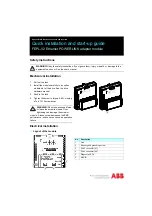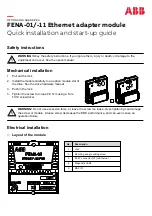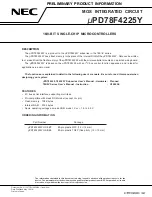
http://www.delta.com.tw/products/plc.asp
DVP-EH
DVP04PT-H
Platinum Temperature Sensors
Instruction Sheet
1
WARNING
Always read this manual thoroughly before using the DVP04PT-H.
In order to avoid electric shock, do not touch the terminals or conduct any maintenance while
power is applied to the PLC.
Never open the PLC. Only qualified Delta personnel should conduct
any internal electrical work on the PLC.
This is an OPEN-TYPE device and is certified to meet the safety requirements of IEC 61131-2
(UL 508) when installed in an enclosure.
The DVP04PT-H must be placed in an environment away from high temperatures, high humidity,
exceessive vibration, corrosive gases, liquids, airborne dust, and metallic particles.
Do not apply AC power to any of the input/output terminals, this will cause permanent damage to
the DVP04PT-H.
Make sure that the DVP04PT-H is properly grounded
, to avoid any electromagnetic noise.
Use wires with resistance when connecting the platinum resistance thermister (RTD) to the PLC.
Please keep the wires as short as possible when connecting the RTD’s to the PLC and keep
power wires as far away as possible from I/O wires to avoid noise interference.
2
INTRODUCTION
2.1 Model Explanation and Peripherals
Thank you for choosing DELTA’s DVP Series PLC. The DVP04PT-H allows the connection of four
platinum temperature sensors (PT100 3-WIRE 100
Ω
3850 PPM/
°
C (DIN 43760 JIS
C1604-1989)). The DVP-PLC EH MPU transforms the sensors input into a 14 bit digital signal,
which may then be manipulated using TO and FROM commands in the ladder logic program.
There are 49 Controlled Registers (CR) in each module (each register is 16 bits).
DVP04PT-H platinum temperature sensors can update software version by RS-485
communication.
The DVP04PT-H works with both Centigrade and Fahrenheit. The input resolution for Centigrade
is 0.1 degrees and for Fahrenheit is 0.18 degrees.
Nameplate Explanation
0.1 C or 0.18 F
20.4VDC ~ 28.8VDC
VX.XX
04PT-H0T4250003
PLC model
Input Power Supply Spec.
Analog Input / Output Module Spec.
Barcode
Model Explanation
Model
Serial Number
Product Series
Input+Output point
Model type
AD: Analog input module
DA: Analog output module
PT: Platinum temperature sensors(PT-100)
TC: Thermocouple sensors(Type J/K)
S: for SS series MPU
P: for EP series MPU
H: for EH series MPU
Production week
Production place (Taoyuan)
Production year (2004)
Production Model
XA: A/D , D/A Functions
RT: Resistor Thermocouple
HC: High speed count input module
PU: single axis positioning unit
2.2 Product Profile and Outline
1. DIN rail location (35mm)
6. Terminals
2. Mounting hole to connect expansion
unit/expansion module
7. Expansion hole of the expansion unit
mounting pins
3. Model name
8. Terminal layout
4. Indicator LED for power, error and run state
9. Mounting port to connect expansion
unit/expansion module
5. DIN rail clip
2.3 External
wiring
PT100
PT100
CH1
CH4
1mA
DC/ DC
5V
AG
+15V
-15V
AG
AG
AG
24+
24-
FG
I-
L-
L+
FG
I-
L-
L+
Converter
System
Class 3 Grounding
(100 of less)
terminal of
power module
Shielded*1
*2
*3
1mA
Shielded*1
Grounding
Note 1: Use only the wires that are supplied
with your temperature sensor (PT
100) for analog input and separate
from other power line or any wire that
may cause noise. Please use 3 wire
for PT 100.
Note 2: Terminal FG is a grounding location for
noise suppression.
Note 3: Please connect
terminal of power
supply module and
terminal of
DVP04PT-H platinum temperature
sensors module to system earth
ground or connects to machine cover.
Warning: DO NOT connect wires to the No
Connection (
●
) terminals.
3
STANDARD SPECIFICATIONS
3.1 Function
Specifications
Platinum Temperature Module
(04PT)
Centigrade (
°
C)
Fahrenheit (
°
F)
Power supply voltage
24 VDC (20.4VDC~28.8VDC) ( –15%~+20%)
Analog input channel
4 channels per module
Sensors type
3-WIRE PT100
Ω
3850 PPM/
°
C(DIN 43760 JIS C1604-1989)
Current excitation
1 mA
Temperature input range
-200
°
C~600
°
C
-328
°
F~1112
°
F
Digital conversion range
K-2000~K6000 K-3280~K11120
Resolution
14 bits (0.1
°
C)
14 bits (0.18
°
F)
Overall accuracy
±
0.5% of full scale of 25
°
C(77
°
F),
±
1% of full scale during 0~55
°
C
(32~131
°
F)
Response time
200 ms
×
channels
Isolation Method
Isolation between digital and analog circuitry. There is no isolation
between channels.
Digital data format
2’s complement of 16-bit, (13 Significant Bits)
Average function
Yes (CR#2~CR#5 may be set and the range is K1~K4096)
Self diagnostic function
Upper bound and lower bound detection per channel
Communication mode (RS-485)
Yes, there are ASCII/RTU modes, communication rate can be
4800 /9600 /19200 /38400 /57600 /115200. Communication
format of ASCII mode is 7Bit, even bit, 1 stop bit (7 E 1).
Communication format of RTU mode is 8Bit, even bit, 1 stop bit (8
E 1). When connecting to PLC MPU in series, RS-485 can’t be
used. The RS-485 is disabled when the DVP04PT-H is connected
in series to an MPU (use the RS485 on MPU).
Connection to a DVP-PLC MPU
in series
When DVP04PT-H modules are connected to an MPU, the
modules are numbered from 0 – 7. 0 is the closest to the MPU
and 7 is the furthest. The Maximum number of modules is 8
modules and they do not occupy any digital I/O points of the MPU.
3.2 Other
Specification
Power Specification
Maximum Power Consumption
2W at 24 VDC (20.4VDC~28.8VDC) (-15 % ~ + 20%)
Environment Condition
Environment Condition
Follow the DVP-PLC MPU.
Static Electricity Prevention
Proper grounding and handling required of the unit and terminals
4
CR (CONTROLLED REGISTER)
DVP04PT-H platinum temperature sensors
Explanation
CR
No.
RS-485
Parameter
address
Latched Register
name b15
b14
b13 b12 b11 b10 b9
b8
b7
b6
b5
b4
b3
b2
b1
b0
#0
H 4064
○
R
Model type
System used, data length is 8bits (b7~b0). DVP04PT-H model code = H 0402
#1 Reserved
#2
H 4066
○
R/W CH1 average number
#3
H 4067
○
R/W CH2 average number
#4
H 4068
○
R/W CH3 average number
#5
H 4069
○
R/W CH4 average number
The number of readings used for “average” temperature on channels CH1~CH4.
Setting range is K1~K4096 and factory setting is K10.
#6
H 406A
╳
R
CH1 average degrees(
°
C)
#7
H 406B
╳
R
CH2 average degrees(
°
C)
#8
H 406C
╳
R
CH3 average degrees(
°
C)
#9
H 406D
╳
R
CH4 average degrees(
°
C)
Average degrees for channels CH1~CH4. (unit: 0.1 degrees C)
#10~ #11
Reserved
#12
H 4070
╳
R
CH1 average degrees(
°
F)
#13
H 4071
╳
R
CH2 average degrees(
°
F)
#14
H 4072
╳
R
CH3 average degrees(
°
F)
#15
H 4073
╳
R
CH4 average degrees(
°
F)
Average degrees for channels CH1~CH4. (unit: 0.1 degrees F)
#16~ #17
Reserved
#18
H 4076
╳
R
Present temperature of
CH1 (
°
C)
#19
H 4077
╳
R
Present temperature of
CH2 (
°
C)
#20
H 4078
╳
R
Present temperature of
CH3 (
°
C)
#21
H 4079
╳
R
Present temperature of
CH4 (
°
C)
Present temperature of channels CH1~CH4. (unit: 0.1 degrees C)
#22~ #23
Reserved
#24
H 407C
╳
R
Present temperature of
CH1 (
°
F)
#25
H 407D
╳
R
Present temperature of
CH2 (
°
F)
#26
H 407E
╳
R
Present temperature of
CH3 (
°
F)
#27
H 407F
╳
R
Present temperature of
CH4 (
°
F)
Present temperature of channels CH1~CH4. (unit: 0.1degrees F)
#28~ #29
Reserved
#30
H 4082
╳
R
Error status
Data register stores the error status, refer to fault code chart for details.
#31
H 4083
○
R/W Communication address
setting
RS-485 communication address.
Setting range is 01~255 and factory setting is K1
#32
H 4084
○
R/W Communication baud rate
setting
Communication baud rate (4800, 9600, 19200, 38400, 57600 and 115200 bps).
Communication format: ASCII mode is 7Bit, even bit, 1 stop bit (7 E 1).
Communication format of RTU mode is 8Bit, even bit, 1 stop bit (8 E 1).
b0: 4800 bps (bit/sec).
b1: 9600 bps (bit/sec). (factory setting)
b2: 19200 bps (bit/sec).
b3: 38400 bps (bit/sec).
b4: 57600 bps (bit/sec).
b5: 115200 bps (bit/sec).
b6~b13: Reserved.
b14: switch between low bit and high bit of CRC code (only for RTU mode)
b15: RTU mode.
b15 b14 b13 b12 b11 b10 b9
b8
b7
b6
b5
b4
b3
b2
b1
b0
Definition of ERR
LED
CH4 CH3 CH2 CH1
#33
H 4085
○
R/W Reset to factory setting
Example: Setting of CH1
1. b0 Reserved
2. b1 Reserved
3. b2: Set to 1 and PLC will be reset to factory settings.
Definition of ERR LED: b12~b15=1111(factory settings)
1. b12 corresponds to CH1: when b12=1, scale exceeds the range or external
contact has no connection, ERR LED flashes.
2. b13 corresponds to CH2: when b13=1, scale exceeds the range or external
contact has no connection, ERR LED flashes.
3. b14 corresponds to CH3: when b14=1, scale exceeds the range or external
contact has no connection, ERR LED flashes.
4. b15 corresponds to CH4: when b15=1, scale exceeds the range or external
contact has no connection, ERR LED flashes.
#34
H 4086
○
R
Software version
Display software version in hexadecimal. Example: H 010A = version 1.0A.
#35~#48 System
used
○
means latched.
╳
means not latched.
R means can read data by using FROM command or RS-485.
W means can write data by using TO command or RS-485.
Explanation:
1. CR#0: The PLC model type.
2. CR#1, CR#10, CR#11, CR#16, CR#17, CR#22, CR#23, CR#28, CR#29 are reserved.
3. CR#2 ~ CR#5: Used to set the number of input readings used for the average temperature
calculation. The available range is K1~K4096 and factory setting is K10.
4. CR#6 to CR#9: The average temperature (
°
C
). The average temperature
is calculated using
multiple temperature readings. Example: If CR#2 is 10, the temperature in CR#6 will be the
average of the last 10 readings on CH1.
5. CR#12 to CR#15: The average temperature (
°
C
). The average temperature
is calculated using
multiple temperature readings. Example: If CR#2 is 10, the temperature in CR#12 will be the
average of the last 10 readings on CH1.
6. CR#18 ~ CR#21: display present temperature (
°
C
) of CH1~CH4 input signal.
Unit: mm




















